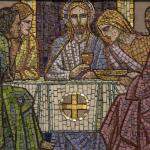
“The same abbba [Xanthias] said, ‘A dog is better than I am, for he has love and does not judge.’”[1] Abba Xanthias believed that the way dogs treated people should be the way we treat each other: our love should be so great that we are able to give it to everyone, no matter who they are and what they have done. Dogs are not so concerned about the things which we are concerned about. They do not care about what we look like, what our reputation is like, whether or not we are deemed wise or foolish, or if we are rich or poor. They do not judge us for such things, indeed, they do not judge us for our behavior so long as we do not harm or frighten them. They love us for who we are and give themselves over to us, showing us their affection. And if we are not foolish, we will feel the warmth of their love and love them back.
Abba Xanthias understood it was love which is important. Even our good works, though they are valuable, are nothing if we do not have love. We can gain salvation in a moment through love, even as we can lose it in a moment if we reject love and embrace hate:
Abba Xanthias said, ‘The thief was on the cross and he was justified by a single word; and Judas who was counted in the number of the apostles lost all his labour in one single night and descended from heaven to hell. Therefore, let no-one boast of his good works, for all those who trust in themselves fall.’[2]
Dogs do not judge our works, but they do react to love. They are willing to give their love to anyone. Only if they are mistreated and abused will they act differently. They will fear us, but even then, even with such fear, they still possess some level of love for us. But if they are well treated, if they are loved and properly fed and looked after, they will not judge us for the foolish things we do.
We, likewise, should not focus on what people do. We must be open to loving everyone. If we love, if we embrace love, we will do the works of love naturally, and such love will lead us to heaven. If, on the other hand, we try to do good, to prove ourselves morally superior to others, but have no love, we have not learned the wisdom offered to us by Xanthias. We end up trusting in our works; we end up thinking they prove to the world how important we are and why we should be treated with respect. Nonetheless, since our works are nothing without love, we will find ourselves being as empty. It is love which brings us the grace which we need to thrive; those works which we do without love are but the dying embers of the love which we once had and lost; but if we note this and return to the way of love, we can be like St. Dismas, the good thief, and find our love rekindled. Then, we will be able to encounter Christ in the kingdom of God and experience the beatitude God has in store for those who embrace such love.
This is why judging people instead of focusing on love puts us on the wrong path. When we do so, we judge on mere appearances instead of reality. We do so, not only for others, but also for ourselves. We would rather look good than to be good. We think the approval of others will satisfy us, but it won’t. We should rather be concerned about the judgment of God, which will not be made based upon the way things appear to be, but on what they really are like. God will judge us on how we love. What is found to be done without love shall perish, but anything truly done in and through love, can be and will be taken up by God and used to bring us into the kingdom of God. For vitality is found with God, and God is love. We must, like the good thief, embrace Jesus in all that he represents. If we embrace him in love, we shall find that love will move us and make us act in such a way as God desires, so that we will be, with Christ, all that God expects us to be, which is to be like Jesus:
The Lord Jesus Christ is justice. No one who acts unjustly is subordinate to Christ, justice. The Lord Christ is truth. No one is subordinate to Christ, the truth, who lies or holds false teaching. The Lord Christ is sanctification. No one is subordinate to Christ, sanctification, when he himself is profane and defiled. The Lord Christ is peace. No one is subordinate to Christ who is hostile or bellicose, unable to say, “I was peaceful with those who hate peace.” [3]
When we embrace love, we embrace truth, justice, sanctification, and peace. Love is kind. Love is caring. Love builds up. Love knows no boundaries to its potentiality. Love has no end. The more we give of it, the more receive. It multiplies itself in its giving. This is exactly what happens in our relationships with dogs. They love us. They bring us peace with their love. They give us joy. They give of themselves, and in return, they find happiness and joy in the love which we give back to them.This is how peace is established and sustained. Dogs show us the way. Love should beget love, and in the sharing of it, there is peace. If we have not yet learned this, if we have not truly lived this out, we should say with Xanthias, that indeed, we are no better than a dog, because dogs know the love which we do not yet possess.
[1] The Sayings of the Desert Fathers. Trans. Benedicta Ward (Kalamazoo, MI: Cistercian Publications, 1984), 159 [Xanthias Sayings 3]
[2] The Sayings of the Desert Fathers, 159 [Xanthias Sayings 1]
[3] Origen, Homilies on the Psalms: Codex Monacensis Graecus 314. Trans. Joseph W. Trigg (Washington, DC: CUA Press, 2020), 90 [Homily 2 on Psalm 36].
Stay in touch! Like A Little Bit of Nothing on Facebook.
If you liked what you read, please consider sharing it with your friends and family!













